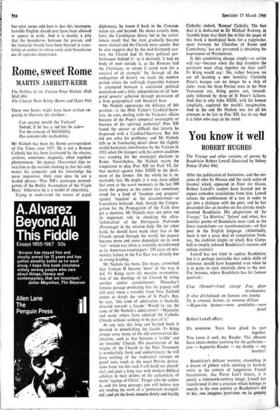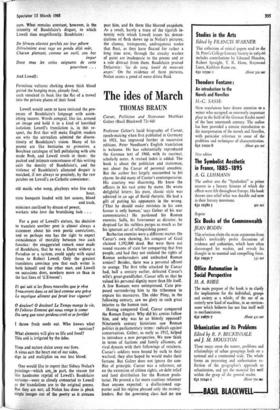You know it well
ROBERT HUGHES
After the publication of Imitations, and the ver- sions of odes by Horace and the tenth satire of Juvenal which appeared in Near the Ocean, Robert Lowell's readers have learned not to expect orthodox translations from him. Lowell refuses the confinement of a text in order to get into a dialogue with the poet, and he has descended like an incubus on the already much- haunted Baudelaire. His adaptations of 'Le Voyage,' La Beatrice,' Spleen' and other, less familiar poems of Baudelaire must rank as the finest translations—or transformations—of that poet in the English language. (Admittedly, there is not a great deal of competition from, say, the clubfoot jingles to which Roy Camp- bell so ineptly reduced Baudelaire's sinuous and aching stanzas.) Lowell has not tried to update Baudelaire, but it is perhaps inevitable that subtle shifts of reference should have happened even when he is at pains to stick relatively close to the text. For instance, where Baudelaire has his famous quatrain: Cest charge d'un pleur in volontaire, 11 reve d'echafauds en fumant son houka. Tu le connais, lecteur, ce monstre delicat, —Hypocrite lecteur,—mon semblable,—mon frere!
Robert Lowell offers;
It's BOREDOM. Tears have glued its eyes together. You know it well, my Reader. This obscene beast chain-smokes yawning for the guillotine— you — hypocrite Reader — my double — my brother!
Baudelaire's delicate monster, chumbling in a dream of gibbets while smoking its hookah, exists in the context of languorous French byzantinism; like Pierre Loti's houris, it is purely a nineteenth-century image. Lowell has transformed it into a creature which belongs as exactly to his own century as Baudelaire's did to his one imagines ho,rn-rims on its gnanny eyes. What remains constant, however, is the intensity of Baudelaire's disgust, to which Lowell rises magnificently. Baixletaire: De feroces oiseaux perches sur leur [Allure Detruisaient avec rage un pendu déjà mar, Chacun plantant, comme un outil, son bec impur Dans tous les coins saignants de cette pourriture . . .
And Lowell:
Ferocious vultures choking down thick blood gutted the hanging man, already foul; each smacked its beak like the flat of a trowel into the private places of their food.
Lowell would seem to have imitated the pro- cesses of Baudelaire's language with aston- ishing success. Words congeal, like ice, around an image and hold it in a kind of horrified isolation; Lowell's translation is, in this re- spect, the first that will make English readers see why the surrealists admired the discon- tinuity of Baudelaire's vision. Many of his poems are like bestiaries or grimoires. a Boschian catalogue of hell pullulating with sins made flesh, and Lowell revels in them: the packed and intimate concreteness of this writing suits the density of Baudelaire's, and the violence of Baudelaire's alienated despair is matched, if not always so precisely, by the raw patches on Lowell's ex-Catholic conscience:
old maids who weep, playboys who live each hour, state banquets loaded with hot sauces, blood and trash, ministers sterilised by dream of power, workers who love the brutalising lash . . .
For a poet of Lowell's stature, the decision to translate another poet is almost always a statement about his own poetic convictions, and so perhaps one has the right to expect coincidences of morality between two such fanatics: the exaggerated remark once made of Baudelaire, that he was a Dante without a Paradiso or a system, could apply with equal force to Robert Lowell. Only the greatest translators convince you that each writer is both himself and the other man, and Lowell on occasions does, nowhere more so than in the last lines of `L'Ennenu":
Et qui sail si les fleurs nouvelles que je rive Trouveront dans ce sol lave comme une greve Le mystique aliment qui ferait leur vigueur?
0 douleur! 0 douleur! Le Temps mange la vie, Et robscur Ennemi qui nous range le coeur Du sang que nous perdons croft et se fortifiel
I throw fresh seeds out. Who knows what
survives?
What elements will give us life and food? This soil is irrigated by the tides.
Time and nature sluice away our lives. A virus eats the heart out of our sides, digs in and multiplies on our lost blood.
One would like to report that Sidney Nolan's paintings—which are, in part, the reason for this handsome reprint of Lowell's Baudelaire versions—were as closely connected to Lowell as the translations are to the original poems. But they are not; all Nolan has done is pluck single images out of the poetry as it streams past him, and fix them like blurred snapshots. As a result, barely a trace of the tigerish in- tensity with which Lowell issues his denun- ciations of flesh shows up in Nolan's pictures; the clumsy, transparent, androgynous nudes that float, as they have floated for rather a long time now, through the streaky washes of paint are inadequate to the poems and as a rule distract from them. Baudelaire praised Delacroix : 'lac de sang. hante de mauvais anges.' On the evidence of these pictures, Nolan seems a pond of more dilute fluid.











































 Previous page
Previous page